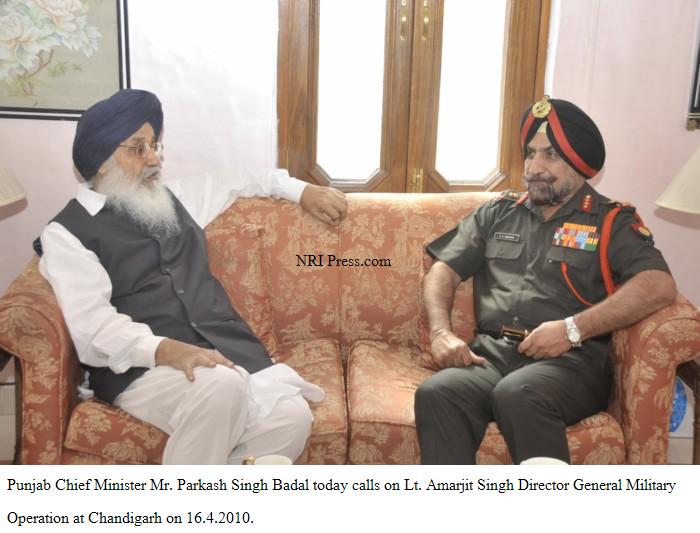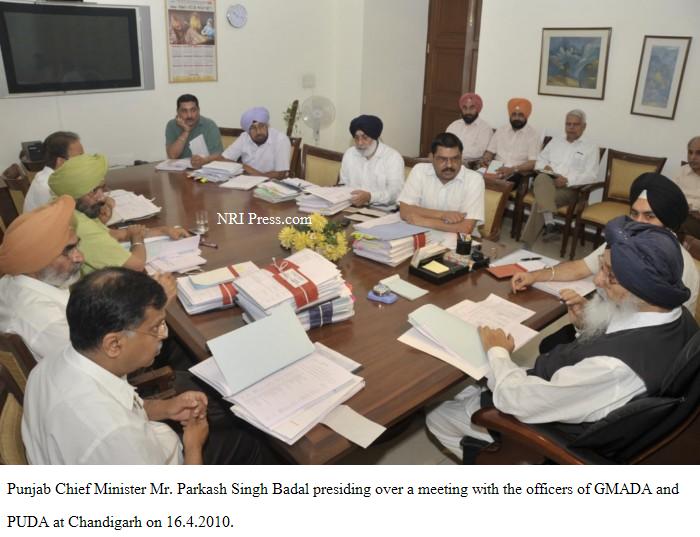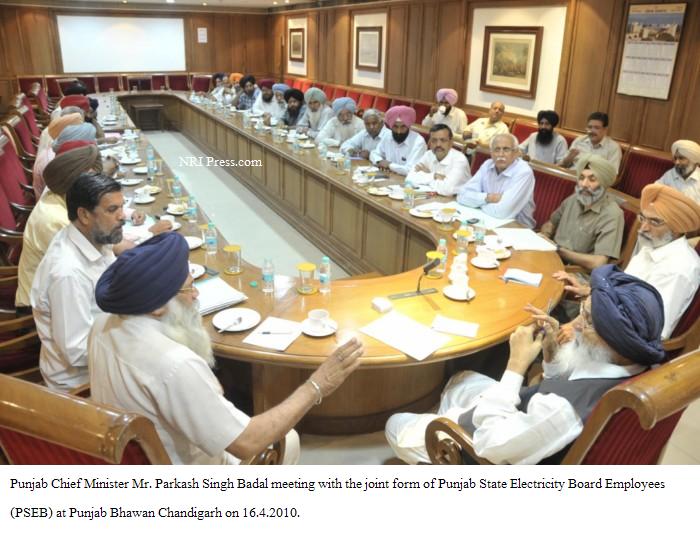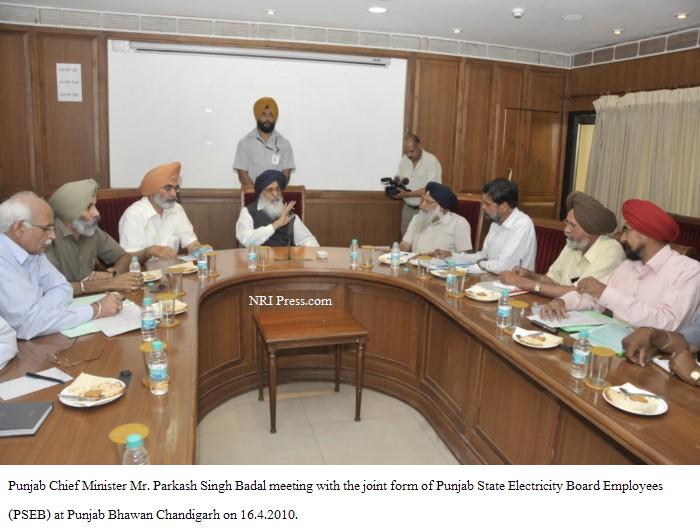| Connecting
over 25 millions NRIs worldwide |
|
|||||||||||||||||||||||
|
||
|
----------------------------------------------------------------------------------------------------- INTERESTS OF EMPLOYEES & PEOPLE OF PUNJAB WOULD REMAIN INTACT AFTER RESTRUCTURING OF PSEB - BADAL CHANIDGARH APRIL 16: Punjab Chief Minister Mr. Parkash Singh Badal today said that interests of the employees of the Punjab State Electricity Board and the people of the state would remain intact after the restructuring of the Board. A Allying the apprehensions from the minds of the employees, Mr. Badal said that a four-member committee had been constituted to sort out all the contentious issues or other related matter under consideration. The committee had been asked to submit its report within a month. The Chief Minister also thanked the employees of the board for the symbolic strike to register their protest against restructuring in a disciplined and a peaceful manner. He reiterated that the state government was committed to the welfare of the employees of PSEB and appealed them not to go on strike in the larger interests of people of Punjab. Responding to the good will gesture of the Chief Minister, the employees of the joint forum of PSEB assured that they would not continue their symbolic strike any more. They appealed the Chief Minister to amicably resolve all the issues relating to the board employees as per the assurance given to them in the meeting in true spirit. Prominent amongst others who were present in the meeting included Principal Secretary to Chief Minister Mr. DS Guru, Member Secretary PSEB Mr. Anurag Aggarwal, Member Administration PSEB Mr. Gurbachan Singh Bachi, Member Distribution Mr. KD Chaudhary besides the leaders of the joint forum Mr. Karajvinder Singh, Mr. Gurmail Singh Balpuria, Mr. Ram Singh Doraha, Mr. Parkash Singh Mann, Mr. Gurnam Singh Khialiwala, Mr. Amrik Singh Nurpur, Mr. Amarjit Singh, Mr. Saidev Singh, Mr. Karam Chand Khanna and Mr. Harmesh Dhiman. -------------------------------------------------------------------------------------------------------------------------
PB. GOVT. TO DEVELOP TWO NEW URBAN ESTATES AT PATHANKOT AND HOSHIARPUR CHANDIGARH APRIL 16: The Punjab Government today accorded formal approval to the development of two new urban estates at Pathankot and Hoshiarpur in the state. A decision to this effect had been taken here today in the 41st meeting of Punjab Urban Planning & Development Authority (PUDA) under the chairmanship of Punjab Chief Minister Mr. Parkash Singh Badal held at Chief Minister’s Office this morning. Disclosing this here today a spokesman of the Punjab government said that a green signal had also been given to the acquisition of 200 acres of land at Pathankot and 140 acres of land at Hoshiarpur for the development of these urban estates. The state government had decided to acquire the said land under the Land Pooling Scheme. Under this scheme both the options (land against compensation & land against land) would be offered to the land owners of the land being acquired at Pathankot & Hoshiarpur. 50% of the total area acquired in each urban estate would be utilized for the development of roads, parks, public utilities and parking area. 5% would be reserved for providing houses to the Economically Weaker Sections (EWS). The government had also approved the budget estimates of PUDA for the year 2010-11. Budget provides for an estimated expenditure of Rs. 17.60 crore on the construction of EWS houses during the year. An estimated amount to the tune of Rs.200.53 crore would be spent on various development works in the state. Besides, Rs. 89.96 crore have been provided for the construction of District Administrative Complexes at Amritsar, Bathinda, Ferozepur and Gurdaspur. The Chief Minister also asked the Board to immediately float a scheme for the allotment of the available sites earmarked for this purpose to the private hospitals/nursing homes and other charitable institutions through advertisements in the newspapers. It was also decided in the Board meeting to allow the 1984 riot affected allottees to sale their houses allotted by the PUDA. Meanwhile, the Department of Housing & Urban Development approved the budget estimates of GMADA for the year 2010-11 in another meeting Chaired by Punjab Chief Minister Mr. Parkash Singh Badal. The state government had also accorded its approval for the upgradation of road network in Mohali by widening and strengthening of various roads. According to the spokesman of the Punjab government said that the roads cleared for upgradation included road from the junction of Sector 85/86,98/99 dividing Sector 98/105, 97/106 and 106/107 upto Kharar-Banur road and the road dividing Sectors 58/54, 58/59, 73/72, 74/75, 90/91 & 93/94. The upgradation of roads in Mohali also include widening & strengthening of the road in Sector 71/72, 69/60 (PCL chowk to Cremation Ground near Balongi) and the road from the junction of Sector 65/65A,66/66A to 66-66A/81 connecting the Chatt road. The budget estimates of the GMADA provided for an expenditure of Rs. 339.92 crore on carrying out various development works in the greater Mohali area. The expenditure on land acquisition would be Rs. 1495.63 crore. Besides Rs. 25 crore has been proposed for the payment of enhanced compensation during the said financial year. In view of the convenience of the residents and visitors of Mohali, it had been decided to fix/install City Maps, Sector Maps and Multi-Directional Boards all-round the township at a cost of Rs. 67.00 lacs. Govt. has also decided to install a sewerage system at Kurali. Under the State Government’s programme to provide clean environment to the residents of Punjab, at an estimated cost of Rs. 20.00 crores Simultaneously, installation of Sewage Treatment Plant at a cost of Rs. 4.00 crore would also be undertaken, the spokesman added. Prominent amongst others who were present in the meeting included Chief Secretary Mr. SC Agrawal, Principal Secretary to Chief Minister Mr. DS Guru, Principal Secretary to Chief Minister-cum-Secretary Housing & Urban Development Mr. SS Sandhu, Chief Administrative PUDA Mr. Vikas Partap Singh and the Chief Town Planner Mr. Kuldip Singh. -------------------------------------------------------------------------------------------------------------------------- CM APPROVES MASTER PLAN FOR BATHINDA CHANDIGARH APRIL 16: The meeting of the Punjab Regional & Town Planning and Development Board held here today at the Chief Minister’s Office this morning under the chairmanship of Punjab Chief Minister Mr. Parkash Singh Badal today gave in principal approval to the master plan of Bathinda. Disclosing this here today a spokesman of the Punjab government said that the master plan prepared for Bathinda would not only ensure the integrated and planned development of the Bathinda city but also stall the unplanned and haphazard growth of the city. Out of total Local Area Planning of 57198 hectare, 58.32% area had been reserved for commercial purpose, 8.23% for industrial and 7.14% for traffic and transportation under the master plan. The master area plan for Bathinda had been prepared in view of the long term perspective for next 20 years i.e. 2031 by which the estimated population in the local planning area would be around 7.86 lakh. The master area plan had also made provision for the allotment of industrial sites to the proposed ancillary units to be developed in the vicinity of Guru Gobind Singh Oil Refinery. It was informed in the meeting that master plans for 9 cities have been notified so far after their preparation. Under the master plan an integrated traffic and transportation blue print had been made with a provision of an outer ring road of 200 feet wide with an inner ring road besides a network of over bridges and under bridges on the railway lines to ensure uninterrupted and congestion free vehicular in the city. The Board also reviewed the master plan for Jalandhar and decided to publish it again after taking into the consideration the suggestions and objections raised by the general public. Prominent amongst others who were present in the meeting included Finance Minister Mr. Manpreet Singh Badal, PWD (B&R) Minister Mr. Parminder Singh Dhindsa, Chief Secretary Mr. SC Agrawal, Principal Secretary to Chief Minister Mr. DS Guru, Principal Secretary to Chief Minister-cum-Secretary Housing & Urban Development Mr. SS Sandhu, Principal Secretary industries Mr. SS Channy, Financial Commission Rural Development & Panchayats Mr. Jagpal Singh Sandhu and the Chief Town Planner Mr. Kuldip Singh. -------------------------------------------------------------------------------------------------------------------------- SUKHBIR, SEKHWAN CONDOLE THE DEATH OF VETERAN JOURNALIST RAMESH KAPILA Chandigarh, April 16: The Punjab Deputy Chief Minister Mr. Sukhbir Singh Badal today condoled the death of veteran journalist Mr.Ramesh Kapila who expired here yesterday. In a condolence message Mr.Badal said that in the death of Mr.Ramesh Kapila, nation has lost a versatile journalist who through his writings had raised many issues of public interest. Condoling the death of Mr. Kapila, Information and Public Relations Minister, Mr.Sewa Singh Sekhwan said that Mr.Kapila always believed in improving society through development journalism and void created by his death was difficult to be filled. They expressed heartfelt sympathies with the bereaved family and prayed to God to give peace to the departed soul and strength to them to bear this irreparable loss. ------------------------------------------------------------------------------------------------------------------------ Punjab to educate 65,000 children under Right to Education-Dr Upinderjit Kaur · Centre should incur the total expenditure to establish adequate infrastructure
Chandigarh April 16: The Punjab Government, by implementing the Right to Education (RTE) Act, would ensure that within three years, every child aged 6 to 14 years would have a school in the neighbourhood. Disclosing this Dr Upinderjit Kaur Education Minister Punjab also made a strong appeal to the Centre for incurring the total expenditure to establish adequate infrastructure in the schools and stressed on various shortfalls in the Act which needed special attention. In a press release, Dr Upinderjit Kaur emphasised that education is the most potent mechanism for the advancement of human beings as it enlarges, enriches and improves the individual's image of the future. With the historic RTE Act came into force, India has joined the league of over 130 countries which have legal guarantees to provide free and compulsory education to children, she added. She categorically said that some of the provisions of the RTE Act were very radical in nature but the Act has ignored important issues, such as free education for children below six and above 14 to18 years. "They won't even have passed tenth standard at that stage. Without passing class 12th, children wouldn't be eligible for even low-paid job openings", she said. The Education Minister further said that the Act assumes children would be ready for class 1st. "The 0-6 age group is very important from the pre-school point of view particularly for the marginalised and vulnerable sections of the society. Exclusion of this age group would mainly affect the poor strata and ignoring the under six age group could lead to the promotion of child labour also," said Upinderjit Kaur. The Education Minister added that under the RTE act all private and unaided schools would have to reserve 25 per cent seats for disadvantaged children from SCs, STs, minorities and disabled categories. In return, they would get the per child expenditure, which states incur. "Reserving 25 per cent seats would amount to discriminating against the other 75 per cent kids who don’t make it to high quality public schools," she lamented. To implement RTE act, she demanded that the Centre should bear all the expenses as states were not be able to incur its share of burden in the ambitious project aimed at providing free education to children because huge amount would be required for its execution. She revealed that her department is finalizing the infrastructural and financial requirements for implementation of the Act in government schools. "We will place our financial requirements before the state government. That exercise is on and it will be finalized in a month," said Upinderjit Kaur. She suggested that the annual outlay for education should uniformly exceed six percent of the national income, as recommended in the National Education Policy, 1986. "Half of this should be allocated to elementary education, and an additional allocation had to be planned for states with inadequate resources", she recommended. Extending a cautious welcome to the RTE Act, the Education Minister said that Act should have been enacted at least fifty years ago. Adding further she said that amendments in the act are necessary in order to make education accessible to all. Dr Upinderjit Kaur said that education comes in the concurrent list. Instead of imposing a common Central Act, the peculiarities of each State has to be considered. The usual practice of sidelining Punjab in the fund support for implementing Acts, should not be repeated in this instance also, she cautioned. The Minister further said that it would be the duty of every parent or guardian to admit their child or ward, as the case may be, to an elementary education in the neighbourhood school but legally not binding upon them. "It is the duty of the state to trace every invisible child trapped in difficult circumstances including trafficking", she added. Talking about the role of teachers, the education minister said quality of education depends on the ability of teachers and 'the right to education is no exception'. Calling upon teaching faculty to become partners in this effort, she said teachers must teach with dignity and help students give full expression to their talent and creativity. Dr Upinderjit Kaur stressed that education system must equip youth with abundant qualities to respond to the challenges of the present market scenario of globalisation and growth. Parents and guardians too have a critical role to play in school management responsibilities as the quality of education of the child will determine the quality of life in nation, she said. The Minister further said that the RTE act suggests that School Management Committees, to be set up with representatives from parents, teachers and local authorities under the Act to monitor the working of schools. "If a school does not have adequate infrastructure, then it will have to develop it within three years. Else, its recognition will be cancelled”, she added. She said that under the RTE Act, schools would not be allowed to take entrance examination, capitation fees and demanding birth certificates at the time of admission of children in Class 1. Also, 220 days of compulsory teaching in a given year and 45 hours of minimum teaching in a week have been also incorporated in the said Act, Upinderjit Kaur said. Making it clear the Minister said that each privately run school, however small it may be, would be required to obtain a certificate of recognition from a certifying authority of State Government. "Such schools would have to meet the minimum infrastructure and teacher-student ratio specified in the RTE Act, and the teacher qualification requirements, in order to be considered for recognition by the certifying authority, she added
-------------------------------------------------------------------------------------------------------------------------- . 40.26 LAKH TONNES WHEAT PROCURED IN PUNJAB Chandigarh, April 16:
Government agencies and private millers procured more than 40.26 lakh tonnes of wheat till last evening as compared to 35.13 lakh tones in previous year on the day.
--------------------------------------------------------------------------------------------------------------------------
Bikaner Canal remain closed for 20 days
--------------------------------------------------------------------------------------------------------------------------
Punjab govt. has failed to take advantage of important central schemes
Sukhpal Singh Khaira The Chief Minister and his govt. rarely miss an opportunity to criticize the UPA govt. for ignoring Punjab, but a closer look at the facts reveals a totally deferent picture, where the Punjab govt. has failed to take advantage of important central schemes. One such national scheme for development of urban India was launched in 2005 by the name of Jawaharlal Nehru National Urban Renewal Mission (JNNURM) in which the UPA govt. pledged to spend Rs. 50,000 crores till 2012. A total of 520 projects for urban development were cleared under this scheme between 2005-2009, unfortunately Punjab got only 5 projects of which four were for Amritsar while one was for Ludhiana. Punjab stood lowest on the national chart with projects worth Rs. 507 crores only till 2009-end, where as states like Maharashtra availed Rs. 5,055 crores, ten times higher than Punjab. Even the Rs. 172 crore Amritsar elevated road to Harmandir Sahib, project of 2006 would have got stalled but for the timely intervention of Prime Minister Dr. Manmohan Singh. Punjab while availing the benefits of JNNURM in 2006 had made a formal commitment with the centre to implement urban area taxation reforms for making the municipal bodies self sufficient in order to get more projects cleared under JNNURM. Unfortunately even after four years the Punjab govt. has failed to implement the mandatory reforms that of levying property tax and users charges, introducing e-governance and municipal accounting, taxation of each house in MC limits on the basis of its size and market value etc.According to the guidelines of JNNURM the central govt. contributes 50% share where as the state govt. has to pool in 20% and the remaining 30% has to be given by the urban local body availing the project as share money. Similarly a whole lot of central schemes go unavailed by the Punjab govt. either for not giving their share or misdirecting central funds for other works and in the process losing out on development of the state. Congress Party raps the SAD-BJP govt. on their failure to take advantage of central schemes such as JNNURM, which could have changed the face of urban Punjab and that the same time advises the CM and his son not to indulge in mischievous and false propaganda against the UPA govt. for its own failures.
--------------------------------------------------------------------------------------------------------------------------
|
||
| NRI
News Media |
|
 Aryans students shine in cultural extravaganza “Roshaan” Aryans Group of Colleges (AGC) organized annual cultural extravaganza “Roshaan” ..........
Aryans students shine in cultural extravaganza “Roshaan” Aryans Group of Colleges (AGC) organized annual cultural extravaganza “Roshaan” .......... n assurance to this effect was given by Mr. Badal in a meeting of the joint forum of the PSEB employees and the management of the Board held here at Punjab Bhawan this afternoon. The Chief Minister assured the employees that there would be no change in their service conditions as they would continue to get the existing benefits including; Pension, Gratuity, Leave Encashment, Dearness Allowance and Annual Increment etc. He categorically said that the Board had not been privatized rather a provision had been made to run it far more efficiently through the formation of two state owned companies.
n assurance to this effect was given by Mr. Badal in a meeting of the joint forum of the PSEB employees and the management of the Board held here at Punjab Bhawan this afternoon. The Chief Minister assured the employees that there would be no change in their service conditions as they would continue to get the existing benefits including; Pension, Gratuity, Leave Encashment, Dearness Allowance and Annual Increment etc. He categorically said that the Board had not been privatized rather a provision had been made to run it far more efficiently through the formation of two state owned companies. 

